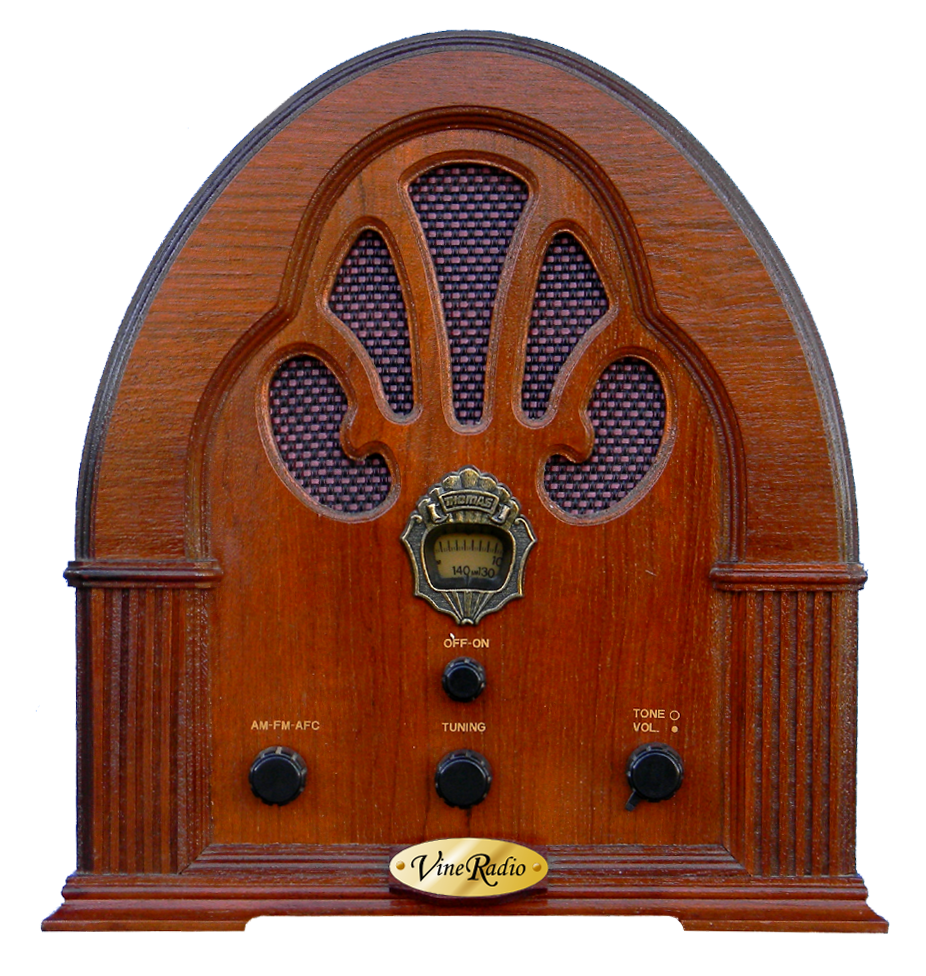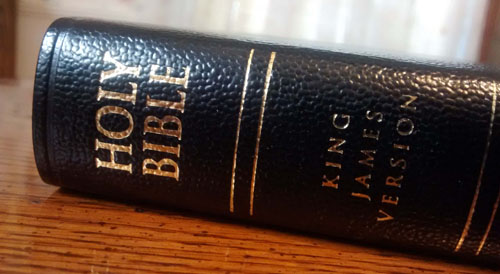Vine Radio on Music
Why do redeemed humans sing? Everyone knows the answer to that question. We sing in church because that is just what we do. We usually don't give it any thought; we just do it; but, why? That is a good question, and we need to examine more closely why redeemed humans should or do sing. Most people have never given it any thought. After all, that is just something everyone does in church, and there are some things that just should not be questioned, but singing is not one. It is time to find out exactly what the Bible has to say about singing.
From the first recorded account of singing in Exodus 15 through the last recorded account of singing in Revelation 15, we find that worshipful singing occurred before the law (Exodus 15:1) and during the law (2 Chronicles 29:28). It occurs during the church (James 5:13). It will occur after the church (Revelation 5:9-10) and at the end of this age (Revelation 15:2-4). We are not told, as a command or ordinance, to sing, but we are encouraged to sing (Colossians 3:16). We know that Christ sang in the congregation at the last supper. (Mark 14:26) We know that He (Christ) sings praises to God (Hebrews 2:12) in the midst of today's congregation, probably through redeemed humans. Therefore, we should sing out of the joy that is within our hearts. (Isaiah 65:14). Worshipful singing during a worship assembly, as well as, in our hearts (Ephesians 5:19) and on our lips (Psalm 63:5) should be continual (Psalm 61:8; Psalm 145:1- Psalm 150:6).
We need to find out what the Bible says about singing and why we (Christians) do/should sing. Also, we need to find out what the Bible tells us about the purpose of singing, the objects of our songs, the mood of our songs, the motivation for our singing; especially as it relates to our worship assemblies.
It needs to be noted that most of what we know concerning songs and singing, as related to worship, comes from David and his instructions for music during worship (1 Chronicles 15) and the carryover of these instructions to Temple worship (2 Chronicles 23:18; Nehemiah 12:36).
Since:>
(1) David was a man after God's heart (1 Samuel 13:14), who will do everything God wants him to do (Acts 13:22) and,
(2) there is nothing mentioned to discourage the practices as instituted by David and,
(3) there is no condemnation of the practices and,
(4) the fact that it seems to be encouraged (Romans 15:9-11; 1 Corinthians 14:15; Colossians 3:15-17),
(5) and, there is no reason to challenge the practices established by David.
Comment:
Acts 13:22 is the scripture that makes us think that all that David did, concerning music in the worship assembly, was pleasing to God. Therefore, we feel that David’s instructions should be guidelines for us.
The New Testament gives us no instructions concerning worshipful singing during worship assemblies. It just tells us to sing praises (Romans 15:9; Romans 15:11; James 5:13) and to sing these songs of praise with thankfulness in our hearts to God! (1 Corinthians 14:15; Colossians 3:15-17)
NOTE:
We do not know what is meant by “as you sing psalms, hymns and spiritual songs” in Colossians 3:16. Are they different kinds, types, or styles of songs? Everyone has their own opinion but, we simply don’t know. Surely, it goes deeper than this but, “The Message” translation on this portion of this verse is splendid – “sing, sing your hearts out to God!”
The Purpose of Singing
The purpose of singing is PRAISE and THANKSGIVING.
Praise
Judges 5:3; 2 Samuel 22:50; 1 Chronicles 23:5; 2 Chronicles 5:13; 2 Chronicles 7:6; 2 Chronicles 20:21-22; 2 Chronicles 29:30; 2 Chronicles 31:2; Ezra 3:11; Nehemiah 12:46; Psalm 7:17; Psalm 9:2; Psalm 9:11; Psalm 18:49; Psalm 21:13; Psalm 30:4; Psalm 47:6; Psalm 47:7; Psalm 59:17; Psalm 61:8; Psalm 63:5; Psalm 66:2; Psalm 68:4; Psalm 68:32; Psalm 69:30; Psalm 71:22; Psalm 71:23; Psalm 75:9; Psalm 95:2; Psalm 96:2; Psalm 101:1; Psalm 104:33; Psalm 105:2; Psalm 106:12; Psalm 135:3; Psalm 138:1; Psalm 146:2; Psalm 147:1; Romans 15:9; Romans 15:11; Hebrews 2:12; James 5:13Thanksgiving
2 Chronicles 5:13; 2 Chronicles 20:21; Nehemiah 12:8; Nehemiah 12:27; Nehemiah 12:46; Psalm 28:7; Psalm 30:12; Psalm 69:30; Psalm 147:7
The Motivation for Singing
The motivation for singing is to be JOY.
1 Chronicles 16:33; Psalm 5:11; Psalm 28:7; Psalm 33:1; >Psalm 81:1; Psalm 90:14; Psalm 92:4; Psalm 95:1; Psalm 96:12; Psalm 98:8; Psalm 126:2; Psalm 132:9; Psalm 132:16; Psalm 149:5; Proverbs 29:6; Isaiah 12:6; Isaiah 42:11; Isaiah 44:23; Isaiah 65:14
The Mood of the Singing
The mood of the songs is to be JOYFUL.
1 Chronicles 15:16; Psalm 95:2; Psalm 100:2; Psalm 107:22; Nehemiah 12:27
The Object of the Songs
The object of the praise and thanksgiving is to be:
NOTE:
In this section it must be understood that this list may not be exhaustive. Only verses containing the words sing, sang, sung, song, and music were used.
It was found that there were fourteen categories, or objects of praise and/or thanksgiving ascribed to God in the verses containing a form of sing. The search was continued through all of the Psalms, and eventually through the entire Bible. The goal was to see if the identity of any more categories into which all praises and thanks could be placed. None were found. Thus, with mild reservations, it can be concluded that every praise desired by God must/will fit into one of these categories.
His Faithfulness
Psalm 89:1His Fortress
(a large and permanent place of security)Psalm 59:16
His Glorious Power
(Exalted)Exodus 15:1; Exodus 15:2; Exodus 15:21
His Goodness
Psalm 13:6His Help
Psalm 63:7His Holiness
(Kingship)2 Chronicles 20:21
His Judgment
Psalm 96:13; Psalm 101:1His Love
(Mercy & Grace)Psalm 59:16; Psalm 89:1; Psalm 101:1
His Refuge
(something to which one has recourse in difficulty)Psalm 59:16
His Righteousness
Judges 5:11; Psalm 51:14; Psalm 145:7;His Salvation
Exodus 15:2; 1 Chronicles 16:23; Psalm 71:23; Psalm 96:2; Isaiah 12:2His Strength
Psalm 59:16; Isaiah 12:2His Wonderful Acts
1 Chronicles 16:9; Psalm 105:2His Word
Psalm 119:172Comment
It should be noted that this list does not put limits on our praise and thanksgiving. One can praise or thank God for anything. These are the attributes, or categories of "objects of our praise/thanks", for which the Bible indicates we are expected to praise and gives thanks.
Look at the list closely. There is probably nothing that we can thank God for that is not covered in this list. The idea is to not forget to praise and thank God for everything. If you will read the Psalms, you will realize that everything was not cake and ice cream for the psalmists. However, they constantly recognized God and their position relative to Him. Even during hard times their desire was to praise God in the way He desired to be praised. "Let everything that has breath praise the LORD. Praise the LORD." (Psalm 150:6) If you are alive you should praise the Lord. Once you are with Him you will praise Him. (Revelation 5:13)
The Frequency of Singing
The frequency of our singing should be daily (& never ending).
We are to praise God daily: from our worship assemblies, from the mountain tops, and from our beds… (Psalms 145 - 150)
Since the purpose of singing is to praise and give thanks to God, it seems only natural that singing daily would be a perfect way to praise God daily (Psalm 145 2).
The reading of Psalms 145 - 150 should inspire you to spend more time praising God.
Facts About Songs/Singing/Music
Caution Note:
David was gone after 1 Kings 2 and 1 Chronicles. Any reference to music and singing after his death should be read with caution. Things may have been changed after his death. However, the music used by Solomon was probably in accordance with David's wishes/instructions. Thus, use caution when reading/implementing the following statements.
Singing May Be Accompanied By Musical Instruments
1 Kings 10:12; 1 Chronicles 15:16; 1 Chronicles 23:5There May/Should Be A Song leader
1 Chronicles 15:22; 1 Chronicles 15:27; 1 Chronicles 25:1Musicians Are To Be Trained and Skilled In Music
1 Chronicles 6:30; 1 Chronicles 6:31; 1 Chronicles 6:32; 1 Chronicles 6:33; 1 Chronicles 9:33; 1 Chronicles 16:42; 1 Chronicles 25:6; 1 Chronicles 25:7
Summary
The mood of the songs is to be JOYFUL.
1 Chronicles 15:16; Psalm 95:2; Psalm 100:2; Psalm 107:22; Nehemiah 12:27




